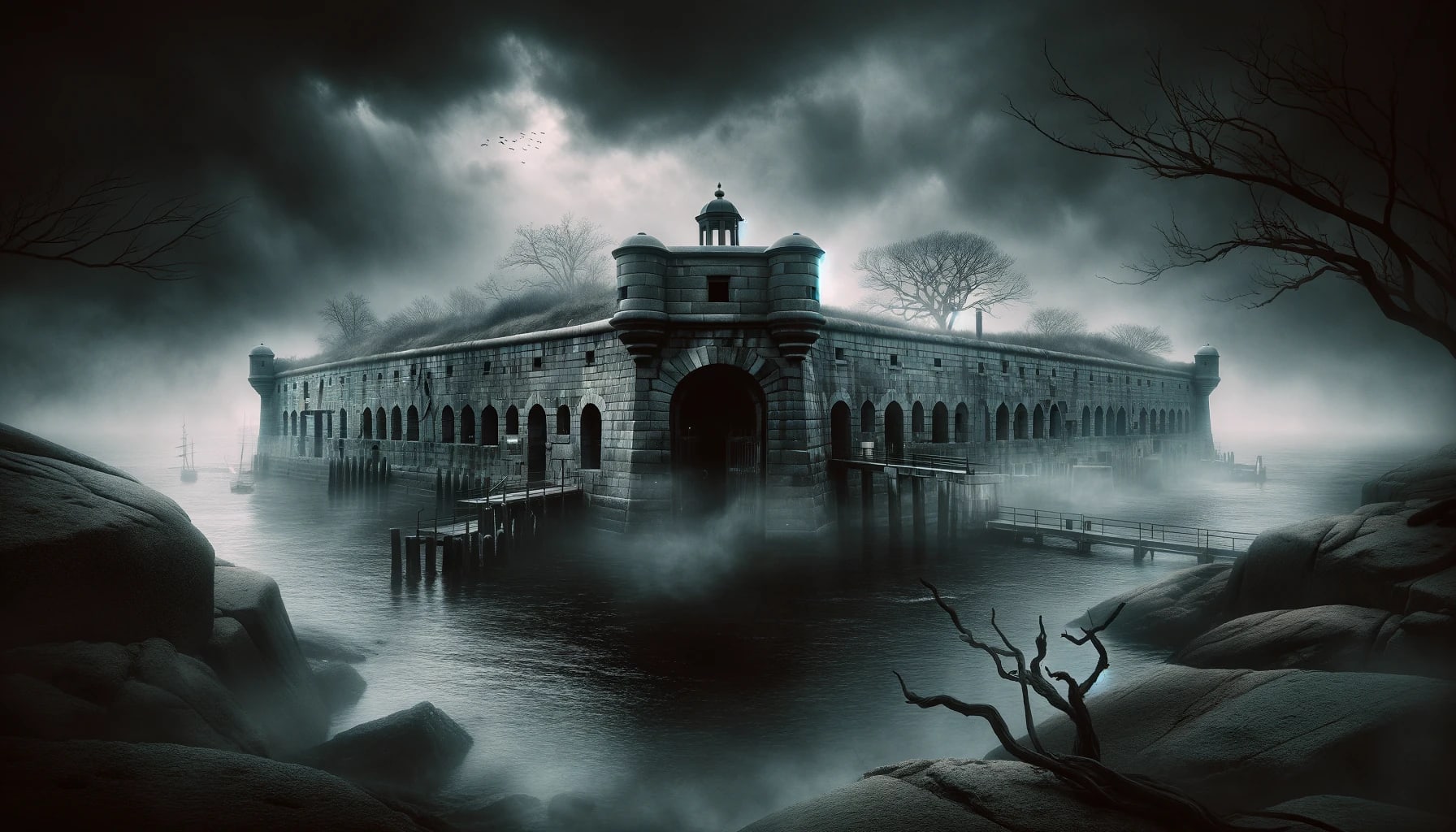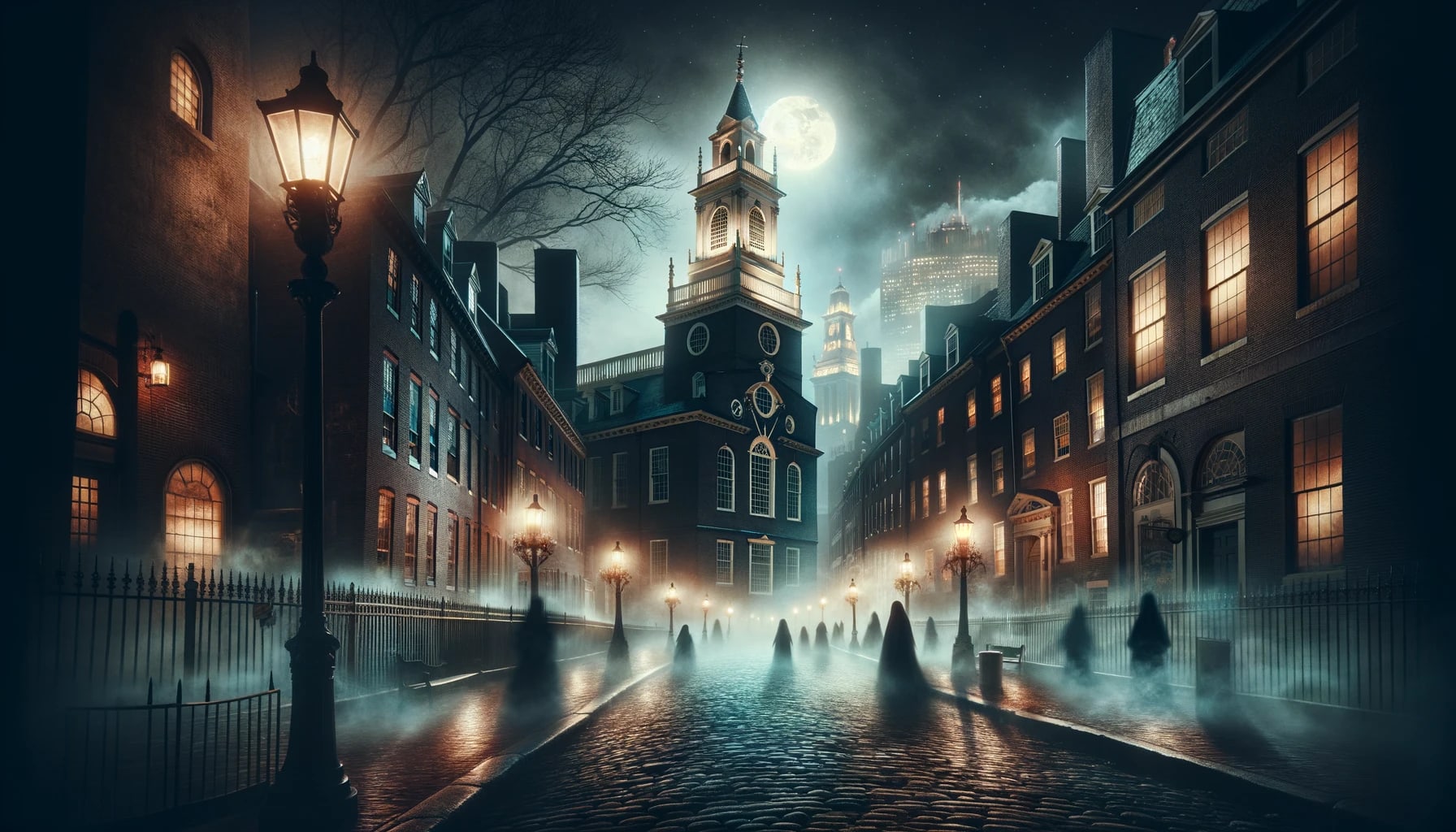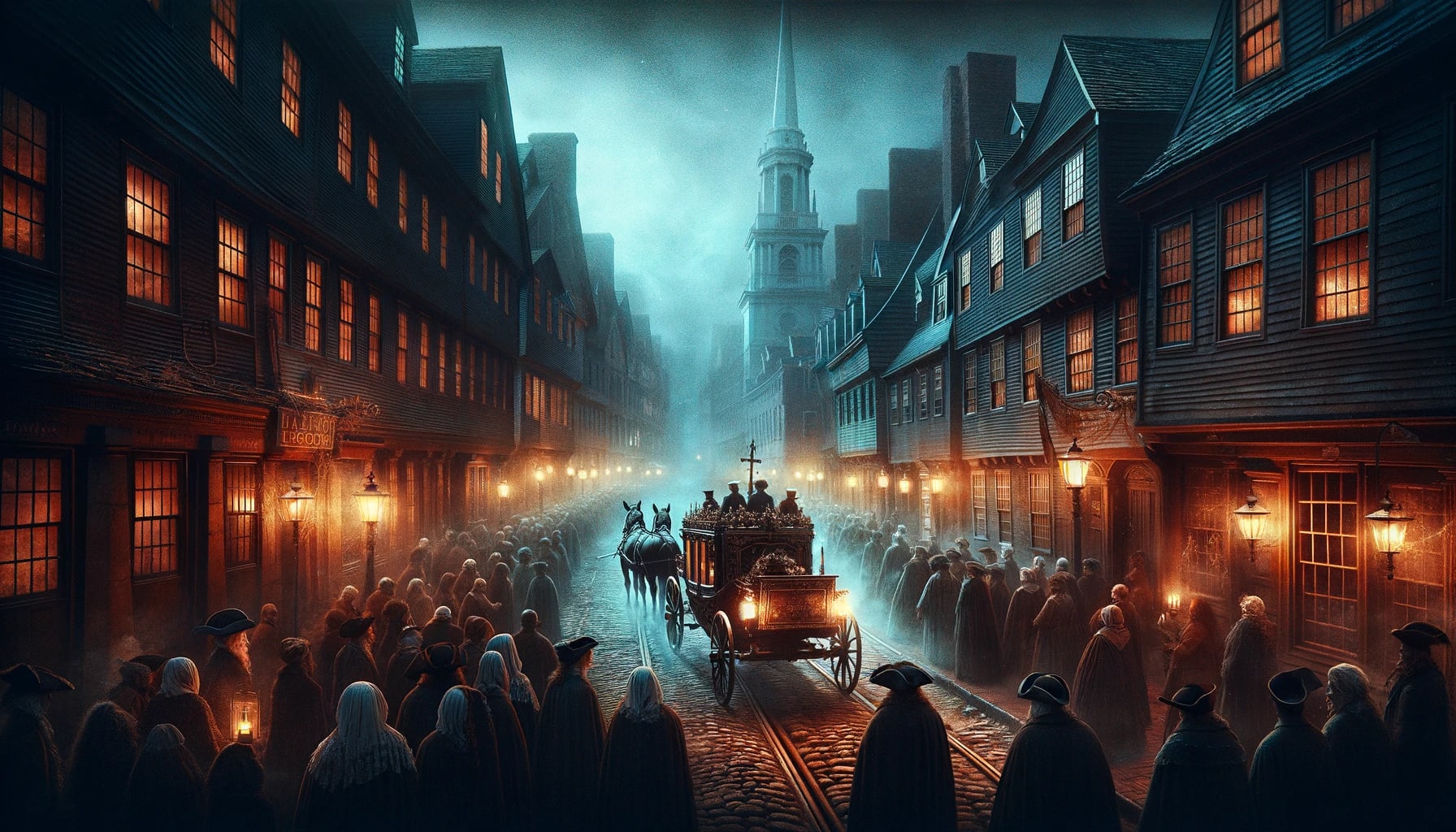According to legend, Fort Warren is haunted by the eerie ghost in mourning of Melanie Lanier. Mrs. Lanier, also known as the "Lady in Black," was lynched after attempting to free her husband from a Union prison in 1862. The details of her tragedy have been passed down for generations, with many of Georges Island's visitors admitting it's what lured them to Fort Warren in the first place. When attempting to separate fact from fiction, we can't help but ask ourselves: is the Lady in Black merely a product of local lore?
Did you know?
- The Lady in Black is rumored to be buried within the fort, in what is known as the Corridor of Dungeons. The corridor can be accessed through a tottering staircase and a dusty wall opening.
- Fort Warren - located on Georges Island - was named after Joseph Warren and built to protect Boston Harbor from the Confederate States Navy during the American Civil War (1861-1865).
- Throughout the conflict, the pentagonal-shaped fortress served as a prison for Confederate soldiers and politicians, recognized as a surprisingly sympathetic institution. It also served as a training facility for various Union army regiments.
- Melanie Lanier's devastating tale has been captured by historian Edward Rowe Snow in his book The Romance of Boston Bay, published in 1946.
The Lady in Black: A Ghost Story
As the story goes, Melanie Lanier was the wife of a Confederate soldier imprisoned at Fort Warren. Upon discovering he was incarcerated, she devised a plan to break him out. Samuel, her husband, only had one job, hum a song to let her know his location.
Depending on the source, she either began her journey in Georgia or South Carolina. What we do know is that she traveled to Hull, Massachusetts, before hopping in a boat and rowing to Georges Island. She wasn't alone, though. In fact, she was in safe company, with two Confederate soldiers, a pickaxe, and - essential for any clandestine operation - a pistol.
An astute lady, she cut her hair and dressed in blue men's clothes to emulate the Union's uniforms, in case she was spotted. On a particularly dark and moonless night, she arrived on the island and stood quietly by the shore, waiting for the signal.
She followed Mr. Lanier's hummed tune to its source and was supposedly met with prisoners who lowered a rope and helped her climb to her husband's cell. Unfortunately, on their way back to the boat, they were stopped by a Union officer. The perfect time to use her weapon, she pulled out her pistol and threatened the officer at gunpoint. Once again, depending on which source you read, he either gained control of the gun and accidentally shot Mr. Lanier, or she lost control of the firearm and fatally wounded her husband. Either way, he was killed instantly.
Melanie Lanier was immediately charged with espionage and sentenced to death by hanging. Her final request was to die wearing a dress since she only had her blue makeshift Union army uniform with her. Sources also vary on what type of garment she had on during her execution. Some say she was handed a proper dress, while others say she was given a black cloak or robe that was part of a costume. Regardless of what she was wearing, we know for sure that it was black.
After she was hanged, soldiers began to report seeing her all over Fort Warren. One soldier even swore he tripped and broke his ankle while running away from the apparition. She wasn't a still ghost, she chased people too!
Another account claims soldiers witnessed a stone rolling across the room on its own while they played poker and five footprints in the snow, that seemed to have started out of nowhere and ended in the same fashion.
The Lady in Black's origin story became a widespread local tale, famous for its tragic yet inspiring nature. But did it really happen?
Exploring the Corridor of Dungeons
Locals believe that Melanie Lanier's coffin can be found in what is known as the Corridor of Dungeons, an especially eerie (and grimy) part of the historic landmark. Caitlin Fisher, in her blog post titled Freep Unsolved: The mystery of Georges Island details how she and her roommate managed to squeeze their way through a window and reach the rumored location of Melanie Lanier's coffin.
On the floor, beneath the thick layer of dust and pigeon droppings, they spotted an old decaying wooden door. Thinking the Lady in Black's coffin was surely under it, they managed to suppress the fear of what they might find and ripped the door open. But what they found was quite anticlimactic. Behind the door stood a plaque carved with the Golden Rule: "Treat others the way you want to be treated." Needless to say, the girls left George's Island sans proof of the Lady in Black but with a lighthearted story to tell.
Debunking the Tale of the Lady in Black
To evaluate if Mrs. Lanier's execution was actually true, we took to the media. After all, an incident this significant surely would have made it to the papers. Yet after scouring newspapers published during the war, there is no mention of a woman executed for espionage in Massachusetts.
Author Edward Rowe Snow (1902-1982) wrote about the Lady in Black in his book The Romance of Boston Bay, detailing the unfortunate end of the Laniers and the hauntings at Fort Warren. After his book was published, he conducted tours on the island, guiding visitors through the fort, and providing some unexpected jump scares (with paid actors dressed in black, spooking the guests). The origin of Mrs. Lanier's tale can be traced to Snow's book, which, even though he stated was a work of fiction, helped perpetuate the myth.
The author pieced together several different local legends to come up with this story and used it - along with the tours - to save the fort from destruction. Apparently, during the 1960s, Fort Warren was essentially becoming a landfill. Recognizing its historical significance, Snow wrote the book in the hopes that it would attract visitors to the location, which would inherently save the fort. Well, his approach worked, and people started to flock to the island to witness the mysterious lady.
But the story being proven false has not stopped people from seeing her. There are, according to Fort Warren tourists, black shadow figures roaming the island. One thing is for sure, it's not the Lady in Black. We can't say the same about the prisoners, though.
There is no doubt that this historic fort is haunted, it was a prison after all. People lived and died here, away from their families, amid a devastating war. With such a traumatic atmosphere, it's no surprise that the spirits of those who died at Fort Warren still linger.
Fort Warren History
Fort Warren is considered one of the most significant Civil War sites in Boston. Its construction began in 1833 and was finished in 1861, shortly after the conflict began. The granite fort is named after the Revolutionary War Hero, Joseph Warren, the man who sent Paul Revere on his famous ride to Lexington to alert that "The British [were] coming!"
During the Civil War, Fort Warren was used by the Union as a humane prison for Confederate diplomats, soldiers, and high-ranking political prisoners. It was also used as a training ground for different Union regiments. The fort was equipped with heavy armament, a searchlight station, a hospital, and even "murder holes," which trapped invaders in the captain's quarters and allowed him to shoot them effortlessly.
A Confederate Memorial was placed on Georges Island in 1963, paying tribute to the one thousand soldiers imprisoned at the fort, out of which thirteen died. Surprisingly, one of them was - none other than - Samuel Lanier.
The bastion fort remained active during the Spanish American War and World War I and was reactivated during World War II before being decommissioned in 1947.
Today, this National Historic Landmark attracts hundreds of tourists to its shores every year. Whether ghost hunting in Boston - or just looking for a dose of American history, Fort Warren should be on your list. Remember to bring your sneakers, these ghosts like to chase people around!
Know Before You Go
Georges Island can be accessed by ferry from Boston. The Boston Harbor Islands National and State Park offers guided tours of Fort Warren with the option to explore on your own. Tours are conducted twice a day at 11:15 a.m. and 1:15 p.m.
Location
Georges Island Boston, MA

The pentagonal fortress rising from Boston Harbor

The haunted corridors where the Lady in Black roams



